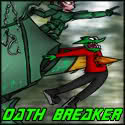|
Yeah "you open the door but set off the alarm" is a pretty hard consequence and pretty much a setback rather than success with consequences. "You open the door, but the tool makes a loud scraping sound. You hear a guard down the hall remark 'you hear something?'" would have been better.
|
|
|
|

|
| # ? Apr 26, 2024 15:39 |
|
Megazver posted:man, you guys make pbta sound so easy and intuitive Human beings are still capable of error, last I checked. And the big downside to any less popular game, especially in comparison to D&D which has a 50-year presence in the hobby and popular culture, is that your only exposure to that game may very well be one guy who's screwing it up. PbtA is a demanding game to GM, but it's pretty easy to play. Two standard-sized letter sheets of paper are all you need to cover the player-facing rules for the vast majority of games. It's also deceptively hard to write, because while the rules grammar is pretty easy, you can write something that's grammatically sound, but: theironjef posted:Indeed, the most common thing I tend to come across is a list of options with 7-9 giving you "Pick one", 10+ "pick 3", and one of the options is always "Nothing bad happens/no one gets hurt/etc" enabling you to change your turn from doing something to just sorta missing or being ineffectual but at least you don't wreck up the place, or go hard. I have come across games that fail at this basic design challenge, all like "On a 10+, pick 3! Don't hurt anyone/no collateral damage/you don't hurt yourself/you don't vaporize a dog/you deal significant damage to a threat" ends up over here, where a move that was intended to let you accept a risk to gain an additional benefit can just fall down into a no-op on a 7-9. A better formulation either always offers enough choices that you'll always get something even spending 1 of them on "no collateral damage", or drops "no collateral damage" from the choices entirely and says "on a 10+, pick 2, or cause collateral damage to pick 3; on a 7-9, cause collateral damage and pick 1".
|
|
|
|
Yes, AW itself has a bunch of additional design care compared to many PbtAs. Another one is that the playbook moves in AW are all either supernatural in some way or give a bonus or additional significance to some mundane activity. A common error is playbook moves that trigger on ordinary activity, meaning that it’s potentially riskier for the character with the move than the one without. The post-apoc setting may also make it easier to establish discrete locations, but from the games I played it it is not necessary for the AW world to be a mad max style wasteland.
|
|
|
|
Paolomania posted:Yeah "you open the door but set off the alarm" is a pretty hard consequence and pretty much a setback rather than success with consequences. "You open the door, but the tool makes a loud scraping sound. You hear a guard down the hall remark 'you hear something?'" would have been better. "You successfully pick the lock and can now open up the door, but while preparing to do so you notice that the door has an alarm attached! There's no obvious way to disable it, but you have a quick way in if you don't mind triggering it." seems reasonable to me, though. More like a partial success with a complication and a hard choice rather than the "suddenly everything is worse!" scenario. The goal of many complications is to put the player in a situation where they have to make interesting choices, right? The players can think about it, and maybe they do decide to set off the alarm... but only after making preparations whereby they ambush the people coming to check up on them. Or they might try to find another way in, but keep note for later that the door is unlocked if anyone needs to use it at a point where the alarm no longer matters. Or maybe someone has some skill or tool they'll remember that might allow them to actually successfully disable the alarm. That's assuming you've already got some pressure going and growing though, and you aren't counting on the complication to add it when it doesn't exist yet. At least that's the way I approach it in the Dungeon World game I host, but I'm hardly a skilled host for these systems, I only first picked them up a short while ago. hyphz posted:The assumption that any system is just outright better than D&D such that nobody should play D&D instead of it is false, and the assumption that narrative games are generally somehow superior to non-narrative games is a fallacy Gotta say right now, I like D&D but Skull Wizards is just outright better. No idea what category, if any, it fits into, but it's definitely better than those narrative/non-narrative games.
|
|
|
|
GlyphGryph posted:"You successfully pick the lock and can now open up the door, but while preparing to do so you notice that the door has an alarm attached! There's no obvious way to disable it, but you have a quick way in if you don't mind triggering it." seems reasonable to me, though. That still seems very much like a failure to me, because 99% of the time what people mean when they say " I pick the lock on the door" is "I get through the door silently" so putting up an alarm on the door as a partial success is just no success. It's pretty much atomic/all or nothing, so the choice between keeping stealth or opening the door just means "You failed, nothing happens. Try something else".
|
|
|
|
That's exactly why the system works; you get choices. It's not a failure, it's just an inflection point where you can proceed with increased threat or take a step back and figure out how to disarm the alarm. In most circumstances, triggering the alarm wouldn't even immediately mean you're spotted and caught, but just that guards are actively searching for an intruder now, or they're on the way and the GM starts a Clock for them getting to where you are, again pushing you forward. The only failure for trying to pick a lock is that you don't pick the lock. Also, picking a lock does not equal stealth. All picking a lock signifies is you don't have a key. Stealth is incidental to that. Bottom Liner fucked around with this message at 08:05 on Feb 3, 2023 |
|
|
|
Hel posted:That still seems very much like a failure to me, because 99% of the time what people mean when they say " I pick the lock on the door" is "I get through the door silently" so putting up an alarm on the door as a partial success is just no success. It's pretty much atomic/all or nothing, so the choice between keeping stealth or opening the door just means "You failed, nothing happens. Try something else". Okay, describe what you think a partial success (or success with setbacks) looks like in this circumstance.
|
|
|
|
Lamuella posted:Okay, describe what you think a partial success (or success with setbacks) looks like in this circumstance. As someone brought up one of the previous times this came up, you could have the player picking the lock but leaving scratches or damaging the lock so that a later guard passing by is going to notice. Which lets the player through silently, but puts time pressure on them. Or maybe the lock gets stuck open so that later when your are running from the guards you can't use it to slow them down. Sure these are slightly longer term stuff , but I feel of the players are sneaking around not having everything be immediate is fine.
|
|
|
|
We probably need to clarify which move we're talking about here, because Act Under Fire absolutely covers the door open but alarm to be disabled outcome: "the MC can offer you a worse outcome, a hard bargain, or an ugly choice" A player wanting multiple things from a move and being offered a choice between them on a 7-9 is absolutely intended
|
|
|
|
We’re not even talking about a specific game, much less a specific move, just the basic concept of “success with a consequence. That’s why we have semantic back and forth stuff like this: Hel posted:
Which could be played out exactly the same as an alarm as mentioned above.
|
|
|
|
Yeah I mean you could just as easily say 99% of the time what people mean when they say " I pick the lock on the door" is "I get through the door without leaving signs of tampering" so leaving scratches on the door or jamming it open as a partial success is just no success. Arguably, damaging the lock is worse because it irrevocably removes the goal of "without signs of tampering" whereas the alarm can still be disabled so the goal of "get through silently" is still on the table The answer is to define goal and approach before rolling and realise that the system explicitly allows compound goals to be separated on a 7-9.
|
|
|
|
Bottom Liner posted:We’re not even talking about a specific game, much less a specific move, just the basic concept of “success with a consequence. That’s why we have semantic back and forth stuff like this: Maybe it's just that we are coming at this from different places, but to me it would play out very differently. As an example: Door closed: nothing happens and you try something else(Failure?) Door open, alarm goes off: The secret meeting you were planning to eavesdrop on is cancelled and everyone runs away or tries to kill you.(Failure) Door opens, guard comes by later and spots scratches: The meeting is still on, so you listen in and learn something, the guard opens the door afterwards, leading to everyone escaping but you still got the info you needed. Or you have to spent time hiding from the guard, which let's people get away(Partial Success) Door opens, guard doesn't see anything suspicious: You listen in on the meeting and because no one knows you are there, you can still tail one of the participants somewhere else. (Full Success) And would be something similar in most other cases I can think of outside of "Break in and murder a guy". Because "knows you are there" and "knows later that you are/ have been there" is very different.
|
|
|
|
This is where having a DM and players who are on the same page comes in, along with players being very clear about what it is they're trying to do. I can imagine circumstances where "you open the door and the alarm goes off" feels like a failure (as Hel outlines below) and also ones where it feels like a mixed success (escaping from a building you just robbed). This sort of reinforces my impression that DMinh PbtA games requires quite a lot more improv skill than DMing something like Pathfinder.
|
|
|
|
Here's how I see this going with a player who's relatively new to the system or with a group that's still establishing tone (7-9 results are where a lot of the mechanical reinforcement of tone happens): Ok you're outside the door to the important room and the guards haven't seen you, what do you do? I try the door handle It's locked. If there's someone on the other side they don't seem to have noticed anything. What do you do? I pick the lock Ok, what are you trying to achieve, beyond unlocking the door? I want to get through the door without alerting a guard or leaving signs that I've been here. Ok, that sounds like acting under fire. If you succeed the door will be open, but you're risking alerting the guards (this is the move "tell them the consequences and ask") That's fine, here goes *Rolls a 7* Ok you feel the tumblers fall into place and the door is unlocked. As you push it open you notice, just in time to stop, a wire running to the metal plate on the door frame. Looks like it's some sort of crude alarm system. What do you do? So in this case, by asking questions, the GM established everything the player wanted to achieve with the move. They then used a GM move to lay out the cost of anything other than a full success before dice were rolled. If the roll was a 6 or less then the GM could go straight to a hard move and set off the alarm, as the main difference between hard and soft moves is whether they are irrevocable. As you play more you can shortcut some of these steps because tone and mechanical consequences get established as you play, but the game also supports resolving mismatches between player and GM understanding of what was on the line for a move and even gives an example of revising an outcome that feels like the player got screwed. Ultimately, in a situation like this, it's about being clear with the player that they do not know what the door is hiding, so there's only so much the GM can tell them about the risks up front. If they want to know more then it's time to look at moves like Read A Situation. It's also worth noting that these games usually require you to "say what your prep demands", so if you wrote down that the door to the important room has an alarm on it then that alarm is there even on a 10+. Maybe you include bypassing it as part of the 10+ roll, maybe not. Decisions like this are how the GM sets the tone of the game and that's something that players and GM should be talking about if it feels like they're not on the same page. Lamuella posted:This sort of reinforces my impression that DMinh PbtA games requires quite a lot more improv skill than DMing something like Pathfinder. Yeah, ultimately Pathfinder et al allow a DM to respond to a failed skill roll with "you try to pick the lock and you fail and nothing happens", whereas in PBTA every roll changes or reveals something new about the situation. As a player I dislike the former much more because why am I even rolling if there's nothing at stake beyond having to roll again, but that's a matter of personal preference. It's important to be up front about this fundamental difference when teaching the game I think.
|
|
|
|
being fair the response to a lockpicking attempt failing in dnd/pf can be "you think you did something to the mechanism. You can try again but you can already tell that the DC is going to be much higher".
|
|
|
|
Oh yeah, absolutely. If I find myself running that kind of system I'm only asking for a roll if something will change on a failure, but as a player I've been in plenty of "nothing happens" situations and I lay some blame at the feet of whoever wrote the rules to make it sound like that's ok.
|
|
|
|
This sort of thing also illustrates why certain Pbtas that added NPC monsters/adversaries with loads of hitpoints sort of failed at the assignment. Hitting the werewolf over and over again isn't what the system is about.
|
|
|
|
|
People pointed out how partial successes work but I didn't see anyone respond to this specifically:Hel posted:Door closed: nothing happens and you try something else(Failure?) This example is extremely wrong because that's not failing forward, and "nothing happens" isn't an MC move. It would be a perfectly fine Controlled 1-3 in FitD, though (Controlled 1-3s suck). Lemon-Lime fucked around with this message at 11:55 on Feb 3, 2023 |
|
|
|
Lemon-Lime posted:People pointed out how partial successes work but I didn't see anyone respond to this specifically: That's the point, Door Open / Keep Stealth, pick 1,1/2 the options are "nothing happens", and the other is a failure. You really shouldn't have that, especially not as a success.
|
|
|
|
Tarnop posted:Here's how I see this going with a player who's relatively new to the system or with a group that's still establishing tone (7-9 results are where a lot of the mechanical reinforcement of tone happens): It's very much this. Part of knowing what's a good "success with consequences" is knowing what the player was trying to accomplish. Apocalypse World even includes, in its examples of moves in play, illustrations of circumstances where this wasn't clearly established and the appropriate response is to rewind and fix the mistake. E.g.: Okay, let me see if I can pick the lock and sneak through here. Sure, no problem, roll to act under fire. Uhhh, I got a 7. Okay, you get the door open, but suddenly an alarm starts blaring. Hold up, hold up--my goal here was to sneak through the door, if an alarm goes off isn't that basically a failure? Oh poo poo, my bad, I didn't realize "remain undetected" was the main goal. Okay, how about... you slip through the door, but just as you silently close it behind you, a guard comes around the corner and you have to scramble behind a tapestry to avoid being seen. You're safe for now, but he's coming closer, what do you do? There are lots of potential varieties of "worse outcome, hard bargain, or ugly choice" here, obviously--maybe you get through but you're not in a good position to spy on the meeting you wanted to see, maybe you have to use up a piece of gear getting through the lock, maybe you have to sacrifice some other goal in order to pull this off, etc.
|
|
|
|
Lamuella posted:being fair the response to a lockpicking attempt failing in dnd/pf can be "you think you did something to the mechanism. You can try again but you can already tell that the DC is going to be much higher". D&D 3.0 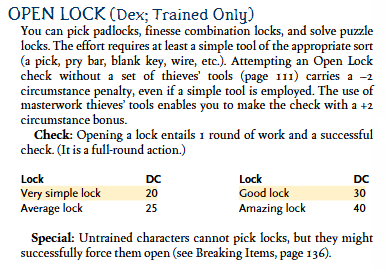 D&D 3.5 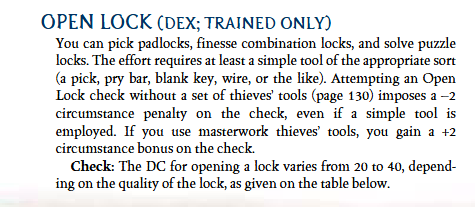 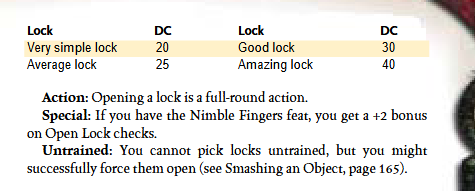 D&D 4e 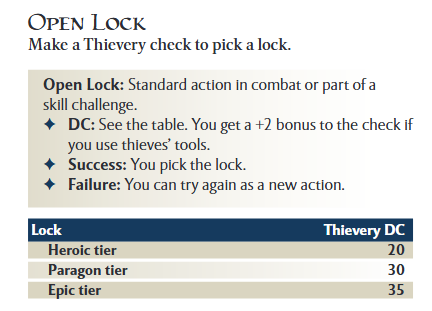 Pathfinder 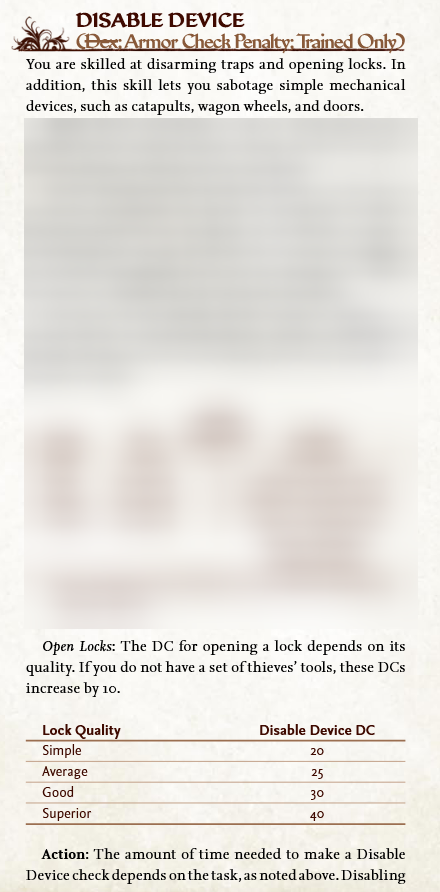  (D&D 5e is missing/omitted deliberately because I don't trust myself to be able to interpret those rules accurately) ___ My point here is that there is no precedent for "you fail to pick the lock, it gets harder the next time". There isn't even a precedent for "you fail to pick the lock, and you cannot try again". - D&D 4e explicitly says you can try again, though there is the implication that if it's part of a Skill Challenge, that you couldn't, or that there's a penalty to failure, even if it's just on the scale of "it counts on the tallied total of successes and failures to see if you succeeded or failed in the Skill Challenge as a whole" - Pathfinder explicitly says you can try again, and differentiates it from disabling traps, which you cannot retry if you fail by too much In all of these cases, the only thing it costs you is "time", as in the full-round action to make the attempt, and even that only matters if A. the DM is keeping track of monster movements or some other aspect of the dungeon that might have consequences for the party taking too long ("the evil Vizier is on the other side of the door and he's already booking it out the window; +40 feet of a head-start to chase him on foot with every failed Open Lock attempt"), and B. if the consequence is actually operating on a time-scale short enough that it matters; ergo a random encounter check every hour isn't going to be hugely impacted unless you only succeed on a natural 19 and have to take upwards of 10 attempts to unlock a door. Now, I get that maybe DMs wouldn't be doing either of these things, at which point unlocking a door becomes an academic exercise as long as the DC is with the character's ability to reach at all, and so the DM might say "no, you can't try again", or "the DC goes up by 2 with every failed attempt", or even "I am going to roll for a random encounter with every succeeding attempt", in order to introduce a potential consequence where one might not exist if played Rules-As-Written... but it wouldn't be Rules-As-Written.
|
|
|
|
Something every fail forward/success with consequences system needs is a metanarrative default. Sometimes you don't want to come up with a complex interpretation of results and just go "I take a murder point for later"
|
|
|
|
I remember listening to a Pathfinder 1e AP once and the rogue failed to pick a lock so the GM just had them roll it again. And again. And again. Like two minutes were spent just sitting around with everyone else waiting for the rogue to finally roll high enough to open the door. I did not keep listening.
|
|
|
|
Why are you calling for a roll to pick the lock unless there is a bad/interesting consequence? If you can't think of something interesting or impactful you should just be condensing more things as part of the sequence into one roll. Calling for tons of rolls is a death sentence in Blades in the Dark, so the GM gets to have so much control over the tension and pacing.
|
|
|
|
Tarnop posted:I pick the lock Basically our DM has got it into his head that he doesn't want us to directly say "Insight check," he wants us to ask things more like "what is he feeling / is he telling the truth" kind of thing. I'm not sure if it's a narrative thing, a covering up the mechanics thing or just something he heard from Crit Role. However he also likes doing skill challenges the same way. So instead of saying "I use perception" and then saying how we use perception, he wants us to just describe the action and then he tells us which skill to roll. The problem with this is that it leads us to stupid hinting descriptions, like "I will look from where I'm standing, and try to see just with my eyes if I can see - not think about or mull over - just see if anything looks out of place." And then get asked to do an investigation check when our perception is much higher. There have been a few times now where we've tried to apply a skill we have a high score in, but have been asked to use a different skill and it feels really weird, because my character only stepped up to attempt that thing because it's something they're good at and trained in, and it sort of feels like not what I was asking to do. I'm sure PBTA probably works out different in practice, but it concerns me that it seems to be very 'DM decides which mechanic you use' when we have a DM who frequently gets that wrong, even in a more straightforward system like D&D.
|
|
|
|
Serf posted:I remember listening to a Pathfinder 1e AP once and the rogue failed to pick a lock so the GM just had them roll it again. And again. And again. Like two minutes were spent just sitting around with everyone else waiting for the rogue to finally roll high enough to open the door. This is literally what the "take 10" mechanic is for.
|
|
|
|
Bobby Deluxe posted:This brings up a problem I'm having in D&D, but it sounds like it could be more of a problem with a particular type of PBTA GM. Yeah, this is dumb and bad in both D&D and PbtA, because as mentioned upthread, even in PbtA games the "don't say the name of your moves" only applies to the GM moves. Players are absolutely free to clarify the intended move behind the in-fiction description of their action. And again, while maybe not all PbtA games include examples like this, Apocalypse World does explicitly tell you that if you misunderstand the player's intention, you back up and use the correct move. For example: I put my gun right up in his face and tell him if he doesn't move right now, I'll blow his brains out. Okay, cool, that sounds like you're going aggro on him. You're prepared to shoot him now if he calls your bluff? Oh no, I'm 100% bluffing, I do not have the stones to actually do violence on somebody, but I'm hoping he doesn't know that. Right, that makes sense. Well, the gun in his face probably counts as leverage here, so roll seduce or manipulate and we'll see if he buys your threat. Totally valid and, in fact, the correct procedure. In D&D or PbtA, everybody should be clear on what they're trying to do both in the fiction and in the mechanics. Now, if players are pulling stuff like "I want to watch him really closely to see if I spot any tells that he's lying, that's Perception, right?" then the DM is well within their rights to say "yeah, no, Insight is the skill for figuring out whether somebody's lying," but it doesn't sound like that's what you're talking about.
|
|
|
|
https://www.youtube.com/watch?v=MsTZrWcudhk So here's a scene that I see as a 'partial success' when you're picking a lock. Unfortunately it doesn't have the next part of the scene, but they succeed in finding the Mcguffin they're looking for, and the alarm triggers a chase scene. It's a good example of a competent character doing something competently but still having major repercussions for their action. [
|
|
|
|
Splicer posted:Something every fail forward/success with consequences system needs is a metanarrative default. Sometimes you don't want to come up with a complex interpretation of results and just go "I take a murder point for later" I have definitely said, when running Dungeon World "you're going to get a cutscene after this dungeon where you'll see the knock on effect of those bad rolls".
|
|
|
|
Bobby Deluxe posted:This brings up a problem I'm having in D&D, but it sounds like it could be more of a problem with a particular type of PBTA GM. The flipside of this is that I have been part of games where someone will just say "I'd like to do a perception check" and left it at that, until the GM had to say "...okay, what are you trying to perceive?". But it's definitely on the GM to ask the player for more in that circumstance. A house rule that I've seen and like is that you can only get a benefit from something if you can describe how you would get that benefit narratively. So if you're a gnome trying to aid a goliath with a strength check you have to describe what you do that's helpful.
|
|
|
|
Bobby Deluxe posted:This brings up a problem I'm having in D&D, but it sounds like it could be more of a problem with a particular type of PBTA GM. Yeah in AW you can say "I Go Aggro on him" but the GM is instructed by the rules to establish what that looks like in fiction. The general idea is that people at the table should be able to picture the action, so that when things go wrong the consequences flow naturally. But you still get to say what move you're trying to make, and you absolutely get to change your approach if you were trying to trigger a different move. The game doesn't lie in tricking players into describing the wrong trigger or weaseling the GM into letting you roll Act Under Fire when you try to Manipulate or whatever. If it needs a discussion, a discussion should be had and table consensus reached before you go to the dice. Trust and buy-in is hugely important. Translating this to D&D, it should probably look something like: I look around the room, trying to find anything the necromancer had hidden in here before he fled Ok, give me a perception roll Oh I was actually trying to roll investigation. Maybe I'm looking through notes to see if there are missing pages, checking the shelves for patches without dust, that kind of thing Ok sure, that makes sense, roll investigation Or maybe a situation where the DM want to clarify what you're actually doing so they can come up with appropriate consequences: The countess laughs and says to the duke, "we all know my house guard could wipe the floor with the peasant rabble making up your army" I make an insight check, I want to know if she's bluffing. Ok, but you're a good distance away from the table she's at and it's hard to make out any subtle tells from that distance. Do you get closer? Her personal guard might spot you if you do Those both feel like legit things to happen at a D&D table, especially since the d20 is going to make you look like an incompetent boob even if you do get to roll for your best skill every time. I would definitely speak to your DM and ask them if you can't come up with a way where everyone agrees on what's actually happening and what skill to roll before dice hit the table.
|
|
|
|
Lamuella posted:This is literally what the "take 10" mechanic is for. I would argue that picking locks is intended to use the “take 20” rule by default, explaining the stupidly high starting DC. Since there’s no penalty for failure, all taking a 20 does is use 20 combat rounds (2 minutes). You should only be taking 10 if you need to shave off a minute and can actually meet the DC (unlikely at low level) and you should only be rolling dice if the lock has to be open in 1 combat round (6 seconds).
|
|
|
|
I wanna say that the "try again with a stacking penalty" standard comes from White Wolf games, or at least that that's where I know it from.
|
|
|
|
Lamuella posted:This is where having a DM and players who are on the same page comes in, along with players being very clear about what it is they're trying to do. I can imagine circumstances where "you open the door and the alarm goes off" feels like a failure (as Hel outlines below) and also ones where it feels like a mixed success (escaping from a building you just robbed). And (not to start a “better/worse” discussion) I think that matters in assessing RPG systems in a more granular way than system 1 bad, system 2 good. Differing RPGs make different demands on players and GMs. Some systems are just incompetent as written, like a roll & move boardgame where you have to get to the “finish” to win but there’s an endless loop and no mechanism for escaping it. For the rest, some have higher or lower demands on players and GMs, but most also have different kinds of skills required to play. An improv based game demands something different and a great GM in one system might do a poor job in another. More importantly, people can prefer one system over another based on the demands it makes: I’m OK with a game with some amount of in-character negotiating, but if I have to negotiate results of my PCs actions with my GM on a meta-level I am miserable. Not everyone wants a game with lots of math or logistics, but some people very much want that. I also observe that player and GM expectations matter a great deal, as well as past history. “I try to open the lock but miss the DC” in a game based in Star Wars or Indiana Jones or the like, I’d be delighted by a result like “a massive bulkhead starts lowering on the party” because of course it does. In a Shadowrun game, “alarms start going off, two auto-turrets activate and you hear the sound of gas hissing, what do you do?” would seem appropriate. For a normal dungeon door in a D&D style game, anything like that on a simple pick locks failure would be more upsetting to me, in part because I grew up under the norm of “partly adversarial” DMs and unless they’re written into the dungeon that would seem like cheating, because the default narrative expectation is that failure to pick the lock means nothing happens. OTOH, if the result was “you hear the sound of heavy footsteps approaching the door and a key being put into the lock,” that would seem like a normal response in a case where there’s someone behind the locked door and I’d be fine with it. TTRPGs have a lot of moving parts and common expectations matter as much to the experience as the rules framework that dictates play.
|
|
|
|
Bobby Deluxe posted:This brings up a problem I'm having in D&D, but it sounds like it could be more of a problem with a particular type of PBTA GM.
|
|
|
|
The lock picking example is an old saw, but it's not really supposed to work the way it's described. The original D&D paradigm was that it interacted with dungeon heist mechanics, in that if you could pick a lock on a chest in a dungeon, you could take what was in the chest instead of having to lug the chest around with you, which would reduce the amount of loot you could get out because of the added encumbrance. So it acted as a bonus mechanic. In "typical" D&D, the idea is that if you can't pick the lock then you break down the door, which creates noise - which I guess is the source of the assumption that picking locks is a stealth skill. AW has no move for picking locks, so it defaults to "act under fire", and the assumption made generally seems to be that "fire" is the threat of being detected which goes back to that stealth assumption again. The "fire" simply being the difficulty of the locking mechanism doesn't seem to be well supported.
|
|
|
|
hyphz posted:
I'd say that's correct, yeah. The fire is all the things that might happen if picking that lock doesn't go how you hope it will, which is one reason that broader intent and context matters a lot in this example. The question of whether the lock gets picked given infinite time and no distractions doesn't seem like an interesting one to me.
|
|
|
|
hyphz posted:The lock picking example is an old saw, but it's not really supposed to work the way it's described. what the guy above me said and this is also because AW is not a game about picking locks and if it comes up it will come up infrequently. AW mechanically supports being sexy postapocalyptic badasses with emotional problems. Blades in the Dark, however, is a game that assumes there will be heists and security mechanisms and has the handy clock mechanic where you can just say, put up a 4 segment clock titled "you're found out" for a very dangerous house and failing the lock pick depending on your position and risk will go a good ways towards filling it. Obivously there's narrative stuff in there too but clocks are great for that mixture of "there's penalties but we don't need to make everything a fail forward, you hosed up on the lock pick and now you have that much less room to gently caress other things up."
|
|
|
|
Clocks are great, and you can strap them on to basically every game if you want to
|
|
|
|

|
| # ? Apr 26, 2024 15:39 |
|
CitizenKeen posted:I understand the realities, but I think it's also rather telling that you listed all these broad hobbies and then "Magic". Not "competitive card games" or "collectible card games" or whatever. You've already sliced that hobby down to just the one thing to begin with. Is there actually any modern good CCG:s that aren't just Magic lites? (I mean Player HP, Creatures fighting, some spells) There's some refresh of older game refreshes like Doomtown/L5R and on computer side Gwent was pretty great game.
|
|
|
















